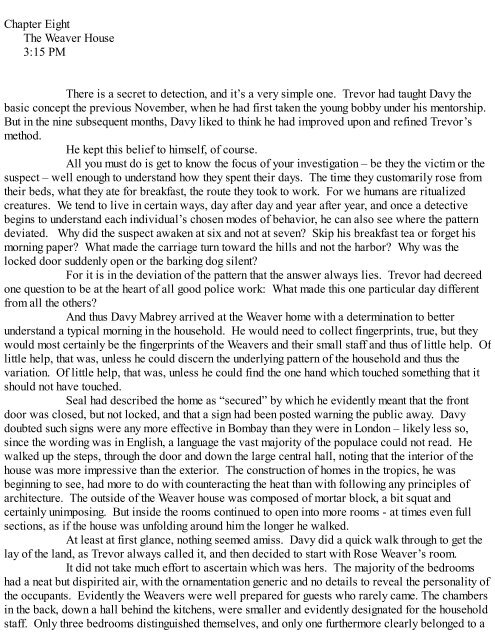Create successful ePaper yourself
Turn your PDF publications into a flip-book with our unique Google optimized e-Paper software.
Chapter Eight<br />
The Weaver House<br />
3:15 PM<br />
There is a secret to detection, and it’s a very simple one. Trevor had taught Davy the<br />
basic concept the previous November, when he had first taken the young bobby under his mentorship.<br />
But in the nine subsequent months, Davy liked to think he had improved upon and refined Trevor’s<br />
method.<br />
He kept this belief to himself, of course.<br />
All you must do is get to know the focus of your investigation – be they the victim or the<br />
suspect – well enough to understand how they spent their days. The time they customarily rose from<br />
their beds, what they ate for breakfast, the route they took to work. For we humans are ritualized<br />
creatures. We tend to live in certain ways, day after day and year after year, and once a detective<br />
begins to understand each individual’s chosen modes of behavior, he can also see where the pattern<br />
deviated. Why did the suspect awaken at six and not at seven? Skip his breakfast tea or forget his<br />
morning paper? What made the carriage turn toward the hills and not the harbor? Why was the<br />
locked door suddenly open or the barking dog silent?<br />
For it is in the deviation of the pattern that the answer always lies. Trevor had decreed<br />
one question to be at the heart of all good police work: What made this one particular day different<br />
from all the others?<br />
And thus Davy Mabrey arrived at the Weaver home with a determination to better<br />
understand a typical morning in the household. He would need to collect fingerprints, true, but they<br />
would most certainly be the fingerprints of the Weavers and their small staff and thus of little help. Of<br />
little help, that was, unless he could discern the underlying pattern of the household and thus the<br />
variation. Of little help, that was, unless he could find the one hand which touched something that it<br />
should not have touched.<br />
Seal had described the home as “secured” by which he evidently meant that the front<br />
door was closed, but not locked, and that a sign had been posted warning the public away. Davy<br />
doubted such signs were any more effective in Bombay than they were in London – likely less so,<br />
since the wording was in English, a language the vast majority of the populace could not read. He<br />
walked up the steps, through the door and down the large central hall, noting that the interior of the<br />
house was more impressive than the exterior. The construction of homes in the tropics, he was<br />
beginning to see, had more to do with counteracting the heat than with following any principles of<br />
architecture. The outside of the Weaver house was composed of mortar block, a bit squat and<br />
certainly unimposing. But inside the rooms continued to open into more rooms - at times even full<br />
sections, as if the house was unfolding around him the longer he walked.<br />
At least at first glance, nothing seemed amiss. Davy did a quick walk through to get the<br />
lay of the land, as Trevor always called it, and then decided to start with Rose Weaver’s room.<br />
It did not take much effort to ascertain which was hers. The majority of the bedrooms<br />
had a neat but dispirited air, with the ornamentation generic and no details to reveal the personality of<br />
the occupants. Evidently the Weavers were well prepared for guests who rarely came. The chambers<br />
in the back, down a hall behind the kitchens, were smaller and evidently designated for the household<br />
staff. Only three bedrooms distinguished themselves, and only one furthermore clearly belonged to a
















